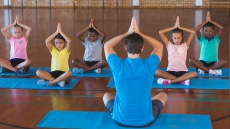As Canadians prepare to set their clocks ahead an hour this weekend for the start of daylight time, chronically sleep-deprived people could be hit hard by the change.
"If you're getting five to six hours of sleep regularly as an adult instead of what's recommended — the seven to eight hours — then you're going to suffer a bit more when you have one less hour of sleep than you would if someone who has more regular sleep scheduling," said Dr. Reshma Amin, a pediatric respirologist and sleep physician at the Hospital for Sick Children in Toronto.
The timing in the brain is also affected by the transition, said Dr. Charles Samuels, medical director of the Centre for Sleep and Human Performance in Calgary.
"Not only do we lose an hour of sleep on that Saturday-to-Sunday transition, but when you wake up at 7 a.m. if that's your wake-up time, it is really in your brain 6 a.m., so there are two reasons for your brain to be tired in the morning.
"While we would generally say a one-hour displacement really isn't a big deal and it's easy to overcome, it's that one weekend of the time change and the Monday morning seems to be where the biggest impact is."
Teens are also often affected by the "spring forward" time change.
Through puberty, some develop what's described as a delayed sleep phase, meaning they become night owls. Added to that, they have to get up earlier from the brain's perspective, making them feel really tired, Samuels explained.
It's more effective for teens to include naps in their routine as opposed to long sleeps which are counterproductive, he said.
For children who are a little more reliant on routine and sleep, Amin recommends a gradual shift in bedtime and wake-up time for a few days ahead of the time change.
So if you typically go to bed at 11 o'clock, roll the clock back in 15-minute intervals each night until you've totalled the time equivalent to what will be lost.
"It's going to be easier for you to make that switch from 11 to 10:45 than it is to go from 11 to 10," said Amin.
As well as getting more sleep leading up to the time change, Samuels said individuals shouldn't try to stay up late during the weekend.
"Everybody should just chill out and not party heavily, go to bed at a reasonable time because it's a cumulative effect. It's very hard to recover that sleep debt once you add to it."
Once adjusted to the time change, it's important to stick to slumber routines, said Jennifer Garden, founder of Sleepdreams, a Vancouver-based company specializing in sleep consultations for children.
Key is good sleep hygiene, which includes creating an environment conducive to shut-eye — like resting in a cool, dark room.
"When you're falling asleep, there's a bunch of physiological changes that happen in order to get you off to sleep," said Garden.
"The first one is your body temperature cools. And so if your room is too hot, it can't get down to the temperature it needs in order to fall asleep properly."
Garden said the optimal condition for sleep is from 16 to 19 C. The idea is to stay two to three degrees cooler than what most people consider to be room temperature.
Parents should also limit screen time for kids, and ensure it's at least two to three hours away from bedtime.
"The bright blue and white light that's emitted from screens — it can be a small as an iPod — but that light cues your brain (that) it's not time to sleep."
Follow @lauren_larose on Twitter.





